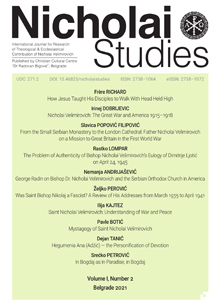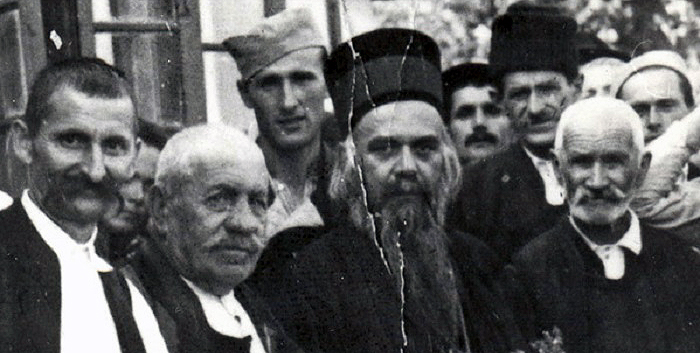New books
The Nicholai Studies, Volume I, Number 2
27. July 2021 - 13:43 The Nicholai Studies, Volume I, Number 2, https://nicholaistudies.org/2021/I , Belgrade: Christian Cultural Center “Dr. Radovan Bigović,” 2021. 330 pp.
The Nicholai Studies, Volume I, Number 2, https://nicholaistudies.org/2021/I , Belgrade: Christian Cultural Center “Dr. Radovan Bigović,” 2021. 330 pp.
The second issue of the Nicholai Studies, an international journal for the research of theological and ecclesiastical contribution of Nicholai Velimirovich (1881–1956), as well as the wider context in which he lived and created, is published.
In the second issue of the Nicholai Studies appeared an essay by Frère Richard from Taizé, inspired by the thoughts of Bishop Nicholai, and an article by Bishop Irinej Dobrijević — on Nicholai Velimirovich’s mission in America 1915–1918, as well as an article by Slavica Popović Filipović on the mission of Nicholai Velimirovich in Great Britain during the First World War. Rastko Lompar’s research published in this issue is dedicated to the problem of the authenticity of Bishop Nicholai’s sermon on Dimitrije Ljotić’s funeral on April 24, 1945, while Nemanja Andrijašević’s article is paying attention to the image of Bishop Nicholai according to the correspondence of Đorđe Radin and Đoko Slijepčević. Željko Perović’s paper is focused on the views of Bishop Nicholai on fascism, and Ilija Kajtez’s article is focused on Velimirovich’s understanding of war, while Pavle Botić’s contribution is dedicated to the mystagogy of St Nicholai Velimirovich. In the second issue, there is a review of the collection of articles on the Hegumenia Ana Adžić by Dejan Tanić, as well as a review of a new publication regarding the orphanage of St Nicholas in Bitola — Bogdaj.
The first issue of the journal Nicholai Studies
5. January 2021 - 15:30 “Tucindan — the birthday of someone who is destined to wander around the world” (“Tucindan” — a Serbian traditional pre-holiday two days before Christmas, and here a wordplay which Velimirovich used: it could be rendered as “the day of wanderers.” In this manner, Bishop Nicholai dated a letter which he sent from Lakavana to Fr. Aleksa Todorović in Munich on January 5, 1952 — cf. CW, XIII, 687)
“Tucindan — the birthday of someone who is destined to wander around the world” (“Tucindan” — a Serbian traditional pre-holiday two days before Christmas, and here a wordplay which Velimirovich used: it could be rendered as “the day of wanderers.” In this manner, Bishop Nicholai dated a letter which he sent from Lakavana to Fr. Aleksa Todorović in Munich on January 5, 1952 — cf. CW, XIII, 687)
On the 140th anniversary of the birth of Nicholai Velimirovich, the first issue of the journal Nicholai Studies has been published. Both printed and digital copy of the first issue of Nicholai Studies are stored in the Repository of the National Library of Serbia: http://repozitorijum.nb.rs/repozitorijum.aspx?issn=2738-1064 The journal is available online as an open-access publication: https://nicholaistudies.org/ The next issue of the journal is scheduled for the second half of the year. The next issue will be published in English and Serbian.
Aristotle in Byzantium
30. December 2020 - 10:46 By: Mikonja Knezevic
By: Mikonja Knezevic
The reception of Ancient Greek Philosophy in Christian thought was for a long time considered under the “pro-crustean” scheme of “Platonic East” and “Aristotelean West”. However, through different studies, books, and critical editions it has been shown that Aristotle—whether he was neglected as kakotechnos or, again, treat-ed in a more affirmative way—was very well-known not only in the West but also in the Eastern Roman Empire. This fact is testified by generations of authors adopting, adapting, commenting, and criticizing the Stagirite, whose works have survived through over than 1000 of Byzantine manuscripts. This volume offers twelve scien-tific studies on different topics of Aristotelean philoso-phy that are to be found in Patristic writers and Byzan-tine philosophers. These studies show that the Stagirite was vividly present in Eastern Roman Empire from the first centuries of its existence till the Fall of Constantinople, which means that one may even speak of an uninterrupted tradition of commenting Aristotle in Byzan-tium. The volume can be treated as some kind of continuation of a previously published book The Ways of Byzantine Philosophy.
John Chrysostom on the Roman Empire: A study on the Political Thought of the Early Church
30. December 2020 - 10:43 By: Constantine A. Bozinis
By: Constantine A. Bozinis
During the 20th century, the patristic scholarship was only able to address the political thought of John Chrysostom in a piecemeal fashion. The present study constitutes the first systematic attempt to remedy this situation by providing a more all-encompassing view of the great Church Father's thinking about public life in Christian antiquity. Its first part is devoted to Chrysostom's perception of the relationship between Church and state. His view of his time's central state authority, the Roman Empire, is carefully reconstructed from select passages in his homiletic corpus. Particular care is taken to highlight the substantial differences between John Chrysostom and Eusebius of Caesarea insofar as their attitude toward the Roman Εmpire is concerned; these differences become visible primarily in the way that the two ecclesiastical authors make use of the motif of "synchronic parallelism," that is to say, the temporal coincidence of Jesus' birth with Octavius Augustus' autocracy and the spread of the Pax Romana throughout the entire Mediterranean world.
Philosophical and Theological Question in Late Byzantium: George Pachymere's Paraphrasis of Pseudo-Dionysius the Areopagite's De divinis nominibus
30. December 2020 - 10:41 By: Christos Ath. Terezis & Lydia Chr. Petridou
By: Christos Ath. Terezis & Lydia Chr. Petridou
George Pachymeres (1242-c.1310) is considered one of the most significant representatives of the Palaeolagan Renaissance in literature and arts, which provided a new style to the spiritual paths. His entire work radiates Aristotelian thought. Pachymeres presents the whole of the Dionysian corpus with a fascination for its internal formation encyclopedism.
However, his main contribution lies in the fact that he established the philosophical and theological requirements for a scientific and rational understanding of the sensible world as a renewed theophany, which is clearly compatible with the principles of the Christian faith.
The Festive Fast
2. December 2020 - 0:14 By: Marigoula Kokkinou and Georgia Kofinas
By: Marigoula Kokkinou and Georgia Kofinas
A guide to olive oil and vegetarian cuisine
More than just a cookbook, The Festive Fast serves as a guide to olive oil and vegetarian cuisine based on the dietary guidelines of the Eastern Orthodox liturgical fasts. The 389 recipes focus on both traditional and creative Mediterranean cuisine, offering healthy food choices without meat and dairy products. Together with quotes from the Church Fathers, this book offers a means to maintain a balance between body and soul. The recipes in this book can be used for sit-down meals, buffets, cocktails, dinners, tea parties, or coffee hours. There are certain ingredients which should be kept on hand which are basic to lenten and vegetarian cuisines. The Festive Fast is a precious guide to balanced nourishment, facilitating the ascetical effort of fasting and the adoption of a proper lifestyle. Its authors have treasured the experience of people and offered rich proposals for inspiration and culinary creativity.

